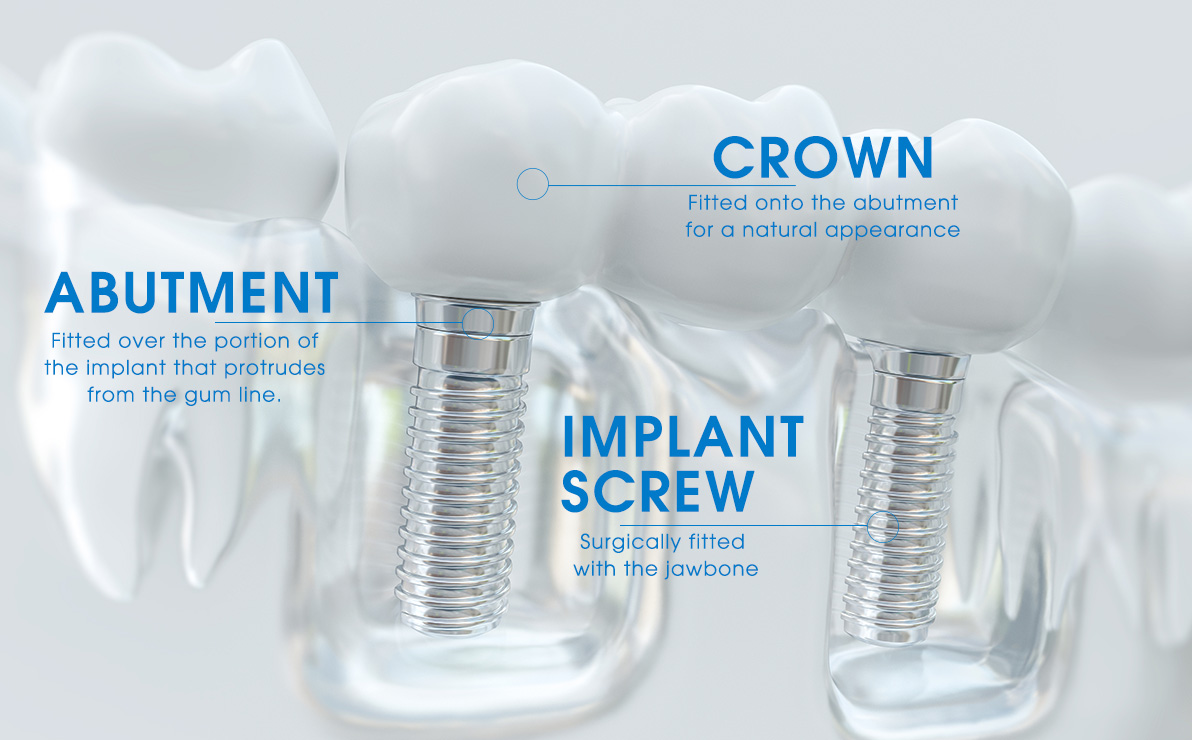 BOOK ONLINE NOW
BOOK ONLINE NOW
 BOOK ONLINE NOW
BOOK ONLINE NOW
 BOOK ONLINE NOW
BOOK ONLINE NOW
 TEL: 028 7034 2934
TEL: 028 7034 2934

A dental implant is used to support one or more false teeth. It is a titanium screw that can replace the root of a tooth when it fails. Just like a tooth root, it is placed into the jawbone which will then be used as a foundation for crowns and bridges. They can greatly improve your quality of life, preserve the health of your jawbone and, with proper oral hygiene, offer a long life of service.

Unlike traditional bridges or dentures, dental implants won’t harm neighbouring teeth.
The implants also feel and look more like your natural teeth and won’t stop you from eating your favourite foods. This unique and state-of-the-art treatment has proven very popular for patients, especially those looking for an alternative to dentures.
Before we begin we ensure your jawbone and mouth are healthy and strong.
If any issues were found during your consultation, including gum disease or we feel the need for a bone graft, we will treat these first to increase the chances of success for your implant. Should you need a bone graft you will need to allow several months for the graft to heal before we can continue.
After we have inserted the titanium screw into place, the jawbone must be allowed to heal fully around it (osseointegration). This normally takes 3 months. While the bone is healing you will be fitted with a temporary tooth to fill the gap.
When the titanium screw has fully integrated we fit it with a custom made crown, bridge or removable denture.
Implants are made from titanium, a material that is well tolerated by the tissues of the mouth. The implant is used to support a ceramic crown or denture.
Implants are a safe, well-established, tried-and-tested treatment. It’s probably true to say that implants, much like natural teeth, will last for as long as you care for them. How well you look after your implants – and whether you go for your regular maintenance appointments – will have the biggest impact on how long they will last.
If you don’t look after your implants they will develop a coating similar to that found on neglected natural teeth. Left untreated, this can lead to gum infection, bleeding, soreness and general discomfort. If your implants are well looked after, and if the bone they are fitted to is strong and healthy, you can expect them to last for many years. However, just as with other surgical implants (such as a hip replacement) there is no lifetime guarantee.
Yes. You can have any number of teeth replaced with implants – from one single tooth to a complete set.
No. But aftercare is essential if you are going to have a long-lasting, successful implant. Waterside’s hygiene team will give you detailed advice on how to look after your implants.
If you have a single tooth missing, you will need an implant to support it. If you have a number of teeth missing, and these are next to each other, you could still have one implant for each tooth. Or you may find that two or more implants may be able to support more than one tooth each. Our team will talk to you about the best option for you.
Implants and the teeth they support can be damaged by an accident in the same way that natural teeth can. So it is important that you wear a professionally made mouthguard if you play sports that involve contact or moving objects.
It depends on the condition of the bone in your jaw. Your dentist will arrange for a number of special tests to find out the amount of bone still there. If there is not enough, or if it isn’t healthy, it may not be possible to place implants without grafting bone into the area first.
Placing an implant is often easier than taking a tooth out and is usually done using a simple local anaesthetic. You will not feel any pain at the time, but just like after an extraction, you may feel some discomfort during the week after surgery.
Your dentist will be able to give you a rough timetable before the treatment starts. Usually the permanent false teeth are fitted 3 to 4 months after the implants are put in. Sometimes treatment takes longer but your dentist will be able to give you a clear idea once they begin the procedure.
After your implants have been placed, the bone in your jaw needs to grow onto and fuse to them. This usually takes a few months. If you are having one, two or three teeth replaced, you may have a temporary denture in the meantime. If you have full dentures, you can keep wearing these while your implants are healing. However, your dentures will need altering to fit properly after the surgery.
As long as you practice good oral hygiene and look after your implants, keep them clean and have them regularly checked by your dentist you should not have any problems. Smoking affects the health of both natural teeth and implants, so, if you smoke, you may need to look after your implants more carefully.


Waterside Dental
7 Waterside
Coleraine
BT51 3DP
E: info@watersidedentalsurgery.com

Monday - Thursday
8:30am - 5:00pm
Friday
7:45am - 1:00pm
Closed for lunch 1:00pm to 2:00pm